
Topics
Guests
- Amanda Klasingnational director of government relations and advocacy with Amnesty International USA.
- Jan Egelandsecretary general of the Norwegian Refugee Council.
Secretary of State Marco Rubio has ordered the termination of all remaining overseas employees of USAID to complete the dismantling of the six-decade-old agency. USAID was an early target of Elon Musk and DOGE. We look at the dismantling of USAID and what it means for people around the world to lose this lifeline, as detailed in a new Amnesty International report. “We talked to somebody who actually saw IVs being ripped out of arms when the stop-work order came down,” says Amnesty’s Amanda Klasing, who describes the consequences of the U.S.'s retraction of critical aid to countries in the Global South and refutes the Trump administration's claims that no deaths can be traced to the cuts. Now, lacking funding from the wealthiest country in the world, aid workers like Jan Egeland of the Norwegian Refugee Council are turning to other countries’ governments to bridge the gap. “The U.S. is leaving international solidarity and compassion completely,” Egeland says, even though “it’s been the leader of humanitarian aid, and it should remain so.”
Transcript
NERMEEN SHAIKH: This is Democracy Now!, democracynow.org, The War and Peace Report. I’m Nermeen Shaikh in New York.
AMY GOODMAN: And I’m Amy Goodman in Washington, D.C.
Secretary of State Marco Rubio has ordered the termination of all remaining overseas employees of the U.S. Agency for International Development, USAID, or USAID, to complete the dismantling of this six-decade-old agency. USAID was an early target of Elon Musk and DOGE, the Department of Government Efficiency.
Meanwhile, the House voted Thursday to approve President Trump’s request to claw back $8.3 billion in previously enacted funding for foreign assistance from USAID and the African Development Foundation. The request seeks to make permanent the cuts to foreign aid already imposed by Elon Musk’s DOGE. Oxfam America warns those cuts could cause 23 million children to lose access to education, while up to 95 million people could lose access to basic healthcare, potentially leading to over 3 million preventable deaths per year. This comes as researchers at Boston University estimate the Trump administration’s massive cuts to the U.S. Agency for International Development have already led to some 300,000 deaths. Billionaire Elon Musk called on Trump to shut down USAID earlier this year.
ELON MUSK: And USAID is a ball of worms. There is no apple. And when there is no apple, there’s — you’ve just got to, basically, rid of the whole thing.
NERMEEN SHAIKH: For more on the dismantling of USAID and what it means for people around the world, we’re joined now by two guests. In Oslo, Jan Egeland is with us, with the Norwegian Refugee Council. He’s just returned from a trip to Mozambique. And here in New York, we’re joined by Amanda Klasing, national director of government relations and advocacy with Amnesty International USA, which has just released a report titled “Lives at Risk: Chaotic and Abrupt Cuts to Foreign Aid Put Millions of Lives at Risk.”
Welcome to Democracy Now! Amanda Klasing, let’s begin with you. If you could outline the main findings of your report, the effects of these USAID cuts?
AMANDA KLASING: Yeah, absolutely. So, we wanted to make sure that there’s a full accounting of the impact on lives around the world. And in the immediate term, we wanted to give a preview of case studies in 12 countries. What does it look like for there to be such chaotic and, in many ways, cruel cuts to programs?
We looked at programs in Haiti, where services for children that have been victims of sexual violence by the gangs, they’re not able to access the funding that they were going to provide for, in particular, girls, or they aren’t able to continue the prevention and services for people living with HIV that are LGBT or sex workers that have been displaced by gangs.
We also looked in countries like Afghanistan, where internally displaced services — services for internally displaced people have been cut dramatically, and it’s leading to women not having access to safe spaces, people losing jobs, including women, the very few jobs left for them.
We looked at Yemen, which is one of the biggest humanitarian crises in the world, and looking at the different services for girls and survivors of sexual violence that have been cut and impacted, including, again, safe spaces, psychosocial support.
In Myanmar, we looked at the Thai-Burma border. We talked to somebody who actually saw IVs being ripped out of arms when the stop-work order came down, and people having to leave hospitals.
It’s just — there’s so much about the big data that is out there and speculation about what this will me in the long term. But in the short term, the rollout of this policy had devastating impacts already on lives. And Secretary Rubio’s defiant testimony that said that lives haven’t been lost just defies logic.
AMY GOODMAN: Well, let’s actually talk about exactly what he said, Secretary of State Rubio. And I’d like to get your comment and also Jan Egeland, whose organization, Norwegian Refugee Council, works with aid groups and populations in need all over the world. Exactly what Rubio said before the House Foreign Affairs Committee, claiming, “No one has died because of USAID [cuts]” — the cutoff of billions of dollars of U.S. support for global health programs. At another congressional hearing, he said, “No children are dying on my watch.” Amanda, first you, then Jan Egeland.
AMANDA KLASING: Again, it just defies logic. We have the estimates of the people that have been cut off from aid, cut off from lifesaving care. We talked to a program in Guatemala. So, you have to understand Guatemala has extraordinarily high rates of sexual violence against girls. Over 4,000 girls a year become pregnant and have very little access to abortion services, and so almost all of them carry their pregnancies to term. There was a program that provided safe nutrition and high-quality food to these pregnant girls, that got cut off. Now, those numbers might not come in right now in front of President — I mean, Secretary Rubio, but, certainly, the lives of these girls have been impacted. We have individual stories that, when you put them all together, you see that it just is — at best, it is a lack of faith to the truth. At worst, it’s just outright lies.
AMY GOODMAN: So, Jan Egeland, how would you characterize what the U.S. secretary of state said, Marco Rubio, when he said, No children are dying on my watch”? Give us a global view. And then, you just came from Mozambique. Talk about what’s happening there?
JAN EGELAND: My organization, Norwegian Refugee Council, works in 40 countries that are stricken by war and disasters. We’re a frontline organization. And I’ll say, I and my frontline humanitarian workers have all been very impressed with USAID, the Bureau of Humanitarian Assistance, their work, and the very timely aid they have given us and multiple other organizations that are saving lives. We, in our case, give emergency relief to nearly 10 million displaced people.
In northern Mozambique, which is the emergency that the world forgot, hundreds of thousands are fleeing violence from the Islamic State of Mozambique. I mean, Islamic State is defined by the U.S. and other Western countries is a very bad terror organization. On top of that, they had three cyclones in the beginning of the year, all climate-induced, climate-driven. And these are very poor people. They did nothing to cause climate change.
What they see, however, is that companies from North America and from Europe are pumping gas and oil and taking precious materials, minerals, from their soil. So, when I then also see that the aid cuts, that are going most abruptly from the U.S., but also other donors, but the U.S. was 60% of humanitarian aid in this region — 60% — and then, to go from 60% to zero means that the water towers in the camp I was had not been filled. This was an infrastructure paid for by American taxpayers, saving lives because clean drinking water is lifesaving. It is empty now. The latrines are overflowing. People have to relieve themselves around the camp. It will lead to epidemic disease. Some of it may spread outside of the camp to the nation, to the region, to the world.
No, it’s not the way to build a railroad to take away the biggest aid program in the world overnight. We’re working to get other nations to fill these gaps. We get aid from 40 different donor nations and international organizations. But when the biggest one leaves overnight, it really leaves a gaping hole in lifesaving aid.
NERMEEN SHAIKH: And what about your response, Jan Egeland, to the fact that the Trump administration maintains that lifesaving aid is exempt from these cuts? What is happening in practice, though, on the ground?
JAN EGELAND: Well, what is happening in reality is that they have left completely Mozambique. They have left completely Afghanistan. They have left nearly completely the Democratic Republic of Congo, where they were also the largest donor. And what we’re then asking is others to step up.
But again, I mean, Norway has five-and-a-half million inhabitants. We pay five times more per taxpayer in foreign assistance. Five times more. It’s more than 1% of gross national income goes to foreign aid, 0.2% from the U.S. So, it’s an average nation, the U.S., in terms of what one is giving per taxpayer.
And now if the U.S. is leaving international solidarity and compassion completely, they will violate every Christian ideal, every humanist ideal, every ideal of every philosophy and religion. I don’t think it will happen. U.S. has traditionally been one of the more generous nations when children around the world are starving.
NERMEEN SHAIKH: Well, precisely, Jan Egeland, I would like to get both of you to respond to this, the fact the monumental improvements in both child and maternal health as a direct consequence of humanitarian aid delivered by the U.S. over the last 30 years. If you could talk about that? And then, Amanda, we’d like to get your response, as well.
JAN EGELAND: No, I mean, it’s fantastic what the U.S. has achieved, limiting the spread of AIDS, limiting the spread of epidemic disease, making education there for youth that have left, that had no hope, and get hope. One other example, as well, I mean, I saw that the U.S. were giving, through the Norwegian Refugee Council, business grants to displaced families. A business grant was $260, not a very large sum, but it led the baker who had fled from Islamic State terror to a camp — he could resume becoming a baker. He has now a business. He sells 300 breads every morning. And he has employed a widow and another very poor family man to work with him.
The U.S. has a lot to be proud of because of its aid. It has traditionally been in the fore — it’s been the leader of humanitarian aid, and it should remain so. We’re not giving up hope to see the U.S. again coming back to the ideals that has been there for all Republican and Democratic administrations since the Second World War.
NERMEEN SHAIKH: And, Amanda Klasing, your response to, in particular, this issue of maternal and child health?
AMANDA KLASING: Yeah, absolutely. What’s incredible is that the U.S. has also funded the wraparound services and programs that are required to really address the drivers of maternal health. And so, there have been programs in safe spaces, programs to address gender-based violence, programs to increase gender equality, programs to increase girls’ education, programs to support women leaders and women human rights defenders. All of these programs, that aren’t necessarily health programs, have led to addressing the very stubborn reasons why there continues to be high rates of maternal death in countries around the world, or infant mortality. So, increasing all of the quality-of-life issues and women’s rights issues in countries around the world also address maternal mortality. And that, for sure, are the types of programs that there is no interest in returning to, and that is part of why we’re so concerned that that’s not going to be included.
NERMEEN SHAIKH: Amanda Klasing, Amnesty International, thank you so much for joining us, and Jan Egeland in Oslo, secretary general of the Norwegian Refugee Council.
And that does it for our show. We’re hiring a senior headline news producer, a director of audience and a director of technology. Find out more at our website, democracynow.org/jobs. I’m Nermeen Shaikh in New York, joined by Amy Goodman in Washington, D.C., for another edition of Democracy Now!

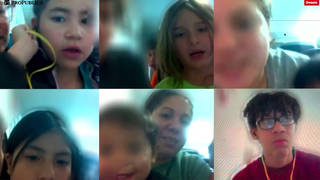
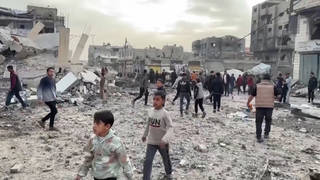

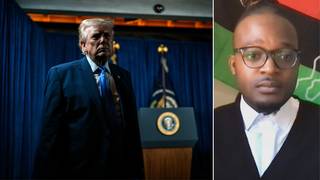







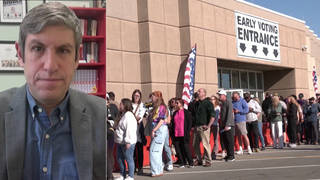
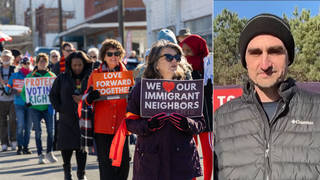
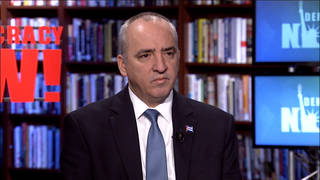
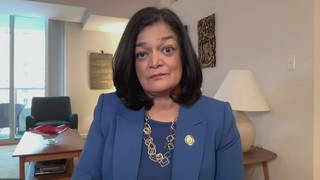
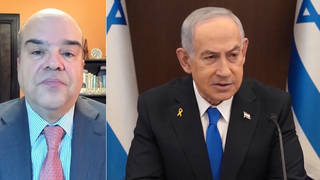
Media Options